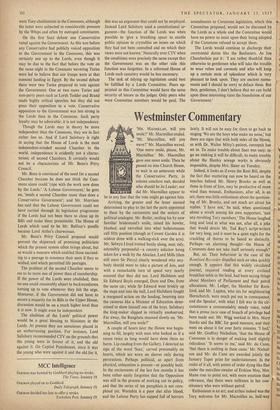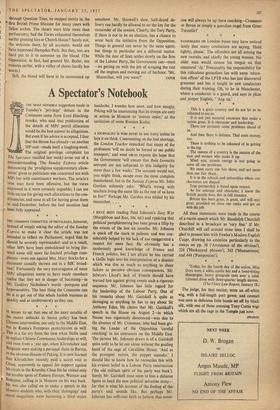Westminster Commentary
Arriving, the greater and the lesser seemed determined to play to the last the parts appointed to them by the cartoonists and the seekers of political analogies. Mr. Butler, smiling his by now familiar bridesmaid's smile, raised his bowler, blushed, and swivelled into what balletomanes call fifth position (though at Covent Garden it is seldom done with a walking-stick over the arm). Mr. Selwyn Lloyd trotted busily along, neat, tidy, ostensibly purposeful—a country solicitor being taken for a walk by the Alsatian. Lord Mills (then still mere Sir Percy) clearly wondered why any- body should want to take a picture of him, and with a remarkable turn of speed very nearly ensured that they did not. Lord Hailsham and Sir Edward Boyle emerged, Dum and Dee, from the same car; while Sir Edward went briskly up the steps and into the hall, Lord Hailsham fought a rearguard action on the landing; beaming into the cameras like a Minister of Education deter- mined to show himself one of the boys. Salisbury the king-maker slipped in virtually unobserved. Far away, the Rangitata steamed slowly on. `Mr. Macmillan, will you smile?'
A couple of hours later the House was begin- ning to fill, largely with men who looked as if a recess twice as long would have done them no harm. Lip-reading from the Gallery, I detected no sign of the word 'Suez,' carved presumably on hearts, which are worn on sleeves only during perorations. Perhaps political, as apart from physical, exhaustion is present—or possibly both. In the excitements of the last few months it has been rather easily forgotten that the Opposition was still in the process of working out its policy, and that the series of ten pamphlets is not com- pleted yet. Weetabix is a poor diet after blood, and the Labour Party has supped full of horrors lately. It will not be easy for them to go back to singing 'We are the boys who make no noise,' but there are signs that with both sides of the House, as with Dr. Walter Mitty's patient, coreopsis has set in. To make trouble about Suez was easy; to go on making it will be difficult; to make trouble about the Hanley sewage works is obviously impossible, despite Mrs. Slater on Tuesday.
Indeed, it looks as if even the Rent Bill, despite the fact that muttering can now be heard on the benches behind Mr. Henry Brooke as well as those in front of him, may be productive of more wind than wounds. Enthusiasm, after all, is an art; there was little enthusiasm about the question- ing of Mr. Brooke, and not much art about his replies. 'I have not,' he said, when questioned about a revolt among his own supporters, 'met any revolting Tory members.' The House laughed long and loud at what was not, after all, a joke that would detain Mr. Ted Ray's script-writers for very long; and it must be a quiet night for the crackling of thorns to be heard so distinctly. Perhaps—an alarming thought—the House of Commons does not take itself seriously enough?
But, no. Their behaviour in the case of the Rom ford Recorder dispelled such an idea quickly enough. It appears that this widely circulated journal, required reading at every civilised breakfast-table in the land, had been saying things about Members of Parliament and their petrol allocations. Mr. Ledger, the Member for Rom- ford, and Mr. Lagden, who sits for neighbouring Hornchurch, were much put out in consequence, and the Speaker, with what I felt was in the cir- cumstances a commendably steady voice, ruled that a prima facie case of breach of privilege had been made out. Mr. Wigg worked in Mrs. Mary Stocks and the BBC for good measure, and they went on about it for over forty minutes. 'I feel,' said Mr. Godfrey Nicholson, 'that the House of Commons is in danger of making itself slightly ridiculous.' It seems to me,' said Mr. du Cann, `that there is nothing in these cases.' Mr. Nichol- son and Mr. du Cann are awarded jointly the January Taper prize for understatement. In the midst of it all, with points of order dying like flies under the merciless swatter of Erskine May, Mrs. Mann rose to point out, with more emotion than relevance, that there were milkmen in her con- stituency who were without petrol.
Enthusiasm is an art; and artless indeed was tho Tory welcome for Mr. Macmillan as, half-way ti d G e li 81 it
b
if
it sl P: st
re
tY
h: dl qi
rr th
C bi
,
to ttr 13 to Lb
CI hi th 131
H
se through Question Time, he stepped stately in, the first British Prime Minister for many years with fallen arches. The cheers were little more than perfunctory; had the Tories exhausted themselves earlier greeting him at Church House? Surely not; the welcome there, by all accounts, would not have impressed Hampden Park. But they, too, are hard put to it to summon up the blood. (The Opposition, in fact, had greeted Mr. Butler, ten minutes earlier, with a volley of cheers hardly less warm.) Still, the blood will have to be summoned up somehow. Mr. Shinwell's slow, half-dazed de- livery can hardly be allowed to set the key for the remainder of the session. Clearly, the Tory Party, if there is not to be an election, has a chance to wrest back the initiative from the Opposition. Things in general can never be the same again; but things in particular are a different matter. While the dust of Suez settles slowly on the fires of the Labour Party, the Government can—must —be getting on with the job of scraping the rust off the engines and moving out of harbour. `Mr.
Macmillan, will you wave?' TAPER



































 Previous page
Previous page